Agroecology Reading time 2 min
Château Couhins to sell its first certified organic vintage
Published on 18 September 2023

After converting the estate, Château Couhins is now bottling its first officially certified organic white wine, which will go on sale in October 2023. Since 1999, the Couhins estate has strived to curb its environmental impact by developing a sustainable approach to winegrowing. Resembling other estates in the region, it has served as a testing ground for INRAE researchers for decades. Château Couhins is also a real winery that sells its production. Until 2008, wines could only be purchased by INRAE employees; now, they are sold on French and international markets. The estate, which officially applied for organic certification in 2019 and will sell its first organic vintage this year, goes above and beyond by implementing innovative agroecological practices, always in partnership with INRAE scientists, with the objective of sharing results with other wineries.
In 2022, INRAE launched a thesis[1] to characterize agroecology in winegrowing and improve the design of agroecological winegrowing systems. Château Couhins is the ideal testing ground in which to study agroecological design in winegrowing. Local winegrowers work alongside INRAE researchers to find ways to adopt more agroecological practices that reflect the local environment, realities and economic challenges of their estates. Three types of projects are planned: agroforestry and the planting of hedges to promote biodiversity and pest regulation; the use of animals such as chicken and sheep in plots; and measures to ensure soil health and biodiversity. Concurrently, investigative research is underway in several regions in France to understand why winegrowers choose to adopt agroecological practices, and how doing so affects an estate overall. Initial results are expected in 2025.
Château Couhins: KEY FIGURES
- An INRAE-owned property since 1968
- 30 hectares of vineyard (20 hectares of red and 10 hectares of white)
- Average annual production: 110,000 bottles of red and 60,000 of white
- Production yield: 37 hL/ha (maximum authorised yield: 54 hL/ha)
- Sales breakdown: 40% of sales to INRAE staff, 50% to Bordeaux wine traders (‘negociants’) and 10% to catering professionals and from the estate’s tourism activities
- The first AB certified organic vintage will go on sale in October 2023
[1] This thesis receives funding from the VITAE project and from INRAE directly.
